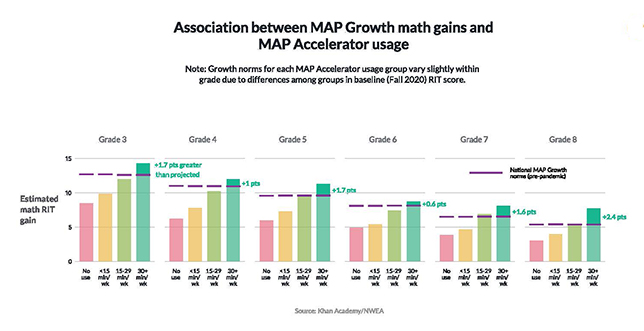NWEA Study: Students Who Used MAP Accelerator 30 Minutes per Week Achieved Big Gains in Math
180,000 Students in Grades 3-8 Tracked During 2020-21 While Using Personalized Learning Tool That Pegs Instruction to MAP Growth Results
- By Kristal Kuykendall
- 08/16/22
In a massive study conducted during the 2020–21 school year, education researchers at NWEA found that students using MAP Accelerator personalized math instruction for at least 30 minutes a week achieved surprisingly big gains across all grades and all demographic categories, according to the study results released today.
MAP Accelerator, developed by education research nonprofit NWEA and Khan Academy, uses scores from the MAP Growth adaptive assessment exam to differentiate math instruction. MAP Growth assessments are taken by more than a quarter of U.S. students several times a year in normal school year, NWEA has said.
The study, which began in summer 2020 as teachers selected to participate were virtually trained on implementing MAP Accelerator, launched in classrooms with students in participating schools taking the MAP Growth math assessment, NWEA said. For the remainder of the year, student participation and progress were closely tracked for later analysis, and the students took the MAP Growth assessment again in the spring 2021 semester.
That analysis showed that students using MAP Accelerator for the recommended “dosage” of half an hour per week achieved math gains that were 9% to 43% greater than projected gains based on pre-pandemic norms, depending on their grade level, NWEA said in its research report.
The study sample included more than 180,000 students in grades 3–8 from 649 schools, according to the report, and the students’ MAP Accelerator usage was tracked for 24 weeks. Progress was ranked using the MAP Growth RIT score, NWEA noted.
Key Findings from the Research
- Among students who used MAP Accelerator for half an hour per week or more, as recommended, test-score gains were an average of 19% larger than projected.
- Scores increased across all grade levels.
- Scores increased across gender, race/ethnicity and poverty level.
- Of the participating students, 45% used MAP Accelerator for less than 15 minutes per week or not at all.
- Students who achieved the recommended usage per week used MAP Accelerator for an average of 20 minutes, three times per week.
- Eighth-graders who used MAP Accelerator for at least 30 minutes per week showed the greatest math gains, with average RIT scores 2.4 points higher than the pre-pandemic MAP Growth norms.
- Students in grade 8 not using MAP Accelerator at all had average RIT scores about 2 points less than the expected norms.
- Students in grades 3 and 5 meeting the recommended usage achieved gains in RIT math scores of about 1.7 points – which is about 14% over the normal third-grader’s improvement in RIT score and about 18% higher than the normal fifth-grader’s improvement in RIT score, pre-pandemic.
- Students in those grades not using MAP Accelerator at all during the study showed a loss in RIT math scores of 3 to 4 points.

Khan Academy founder Sal Khan noted that despite the pandemic interruptions and unique challenges students faced during the 2020–21 school year, the students using MAP Accelerator as recommended “made gains in math that are larger than projected, even for a pre-pandemic school year.”
“The results of this study offer a lot of hope for addressing the impacts of this pandemic, which has disproportionately hit some of our most underserved populations,” said NWEA CEO Chris Minnich. “It underscores the importance of increased opportunities for students to engage with targeted math content, and a tool like MAP Accelerator makes it possible for teachers to do that efficiently.”
Learn more at the NWEA website or download the full research report at Khan.com/MATechReport2022.
About the Author
Kristal Kuykendall is editor, 1105 Media Education Group. She can
be reached at [email protected].